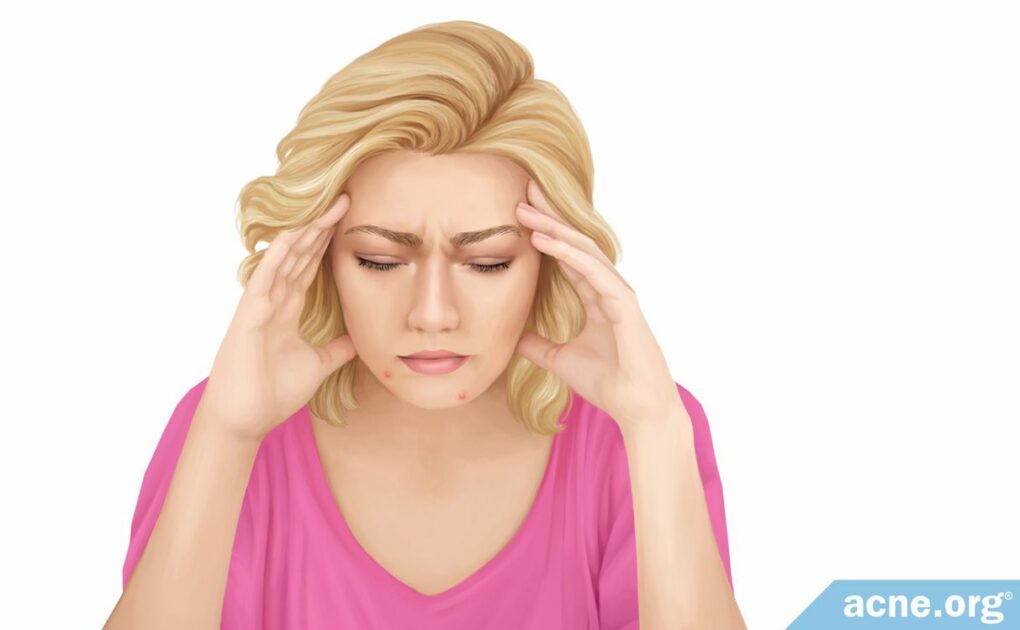Stress Is Associated with Acne, and Women Experience More Stress

The Essential Info
Everyone gets stressed from time to time, but if stress becomes chronic it may lead to inflammation in the skin. Since acne is at its core an inflammatory disease, more inflammation in the skin may lead to more acne.
Females as a whole tend to experience more stress than males throughout their lives, with research showing us that females experience on average 50% more chronic stress-related disorders when compared to males. This is mainly due to the fluctuating hormones during the menstrual cycle, but also partly due to socioeconomic factors like gender-based discrimination and lower pay. Furthermore, the extra responsibility that comes with roles that women often fill, like care-taking, can add to chronic stress.
Some stress is unavoidable, but studies show us that women can effectively reduce stress with:
- Nutrition: Eating whole foods instead of processed foods, particularly including colorful fruits and veggies and omega-3 fats (up to 6 fish oil pills a day), gives the body what it needs to stay calm.
- Exercise: Regular exercise is far and away the best way to reduce stress. Getting “blood in the brain” instantly reduces stress.
- Getting outside: Being outdoors relaxes the body, elevates mood, and decreases stress. You can combine being outside with exercise for a one-two punch.
- Meditation: Meditation is not just “Eastern philosophy” anymore. Evidence shows us clearly that 8 – 15 minutes a day helps calm the brain and keeps women feeling more in control all day long.
- Community: We are tribal animals. Being part of a group and getting physical touch is huge. Loneliness leads to stress, so take the time to join and attend a group, and touch the people you love.

The Science
- The Connection Between Stress and Acne
- Women Experience More Stress than Men
- Why Women Experience More Stress than Men
- How to Manage Stress
Psychological stress is a negative state of mind that women as a whole tend to experience more than men. If stress continues for long periods of time, it can become chronic, leading to disorders like chronic anxiety and depression, and also potentially more acne.
To understand how stress might result in more acne, let’s delve deeper into the connection between the two.
The Connection Between Stress and Acne
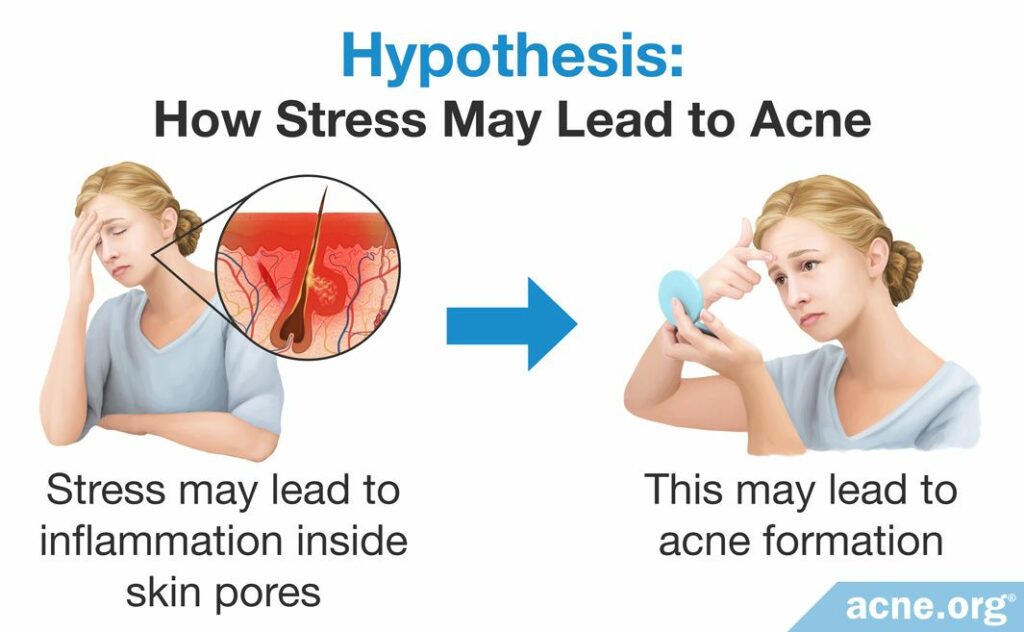
The hypothesis for how stress may lead to acne: Researchers believe that stress may cause inflammation inside skin pores. This is relevant because acne is an inflammatory disease, meaning that inflammation plays an important role in all aspects of acne development. So, if stress causes inflammation in skin pores, it is possible that it will aggravate acne.
Stress might lead to inflammation by means of chemicals called neurotransmitters. Neurotransmitters exist all over the human body and are released by the brain when the body is stressed. Research has discovered that people with acne have more stress-related neurotransmitters in their skin than people without acne. Whether these stress-related neurotransmitters are the cause of the inflammation present in acne is unknown, but it is a possibility that researchers are investigating.1-3 For example, studies show that acne bacteria, which is present on the skin of most people, can sense and react to certain neurotransmitters and thus might act as a relay between stress and acne.4
Emerging research also suggests that stress triggers the release of additional acne-promoting substances:
- Inflammatory substances called cytokines: Evidence is mounting that increased inflammation can lead to breakouts.
- Stress-related hormones, some of which may trigger more skin oil production: An increase in skin oil production is well-known to contribute to acne.5-8
Women Experience More Stress than Men
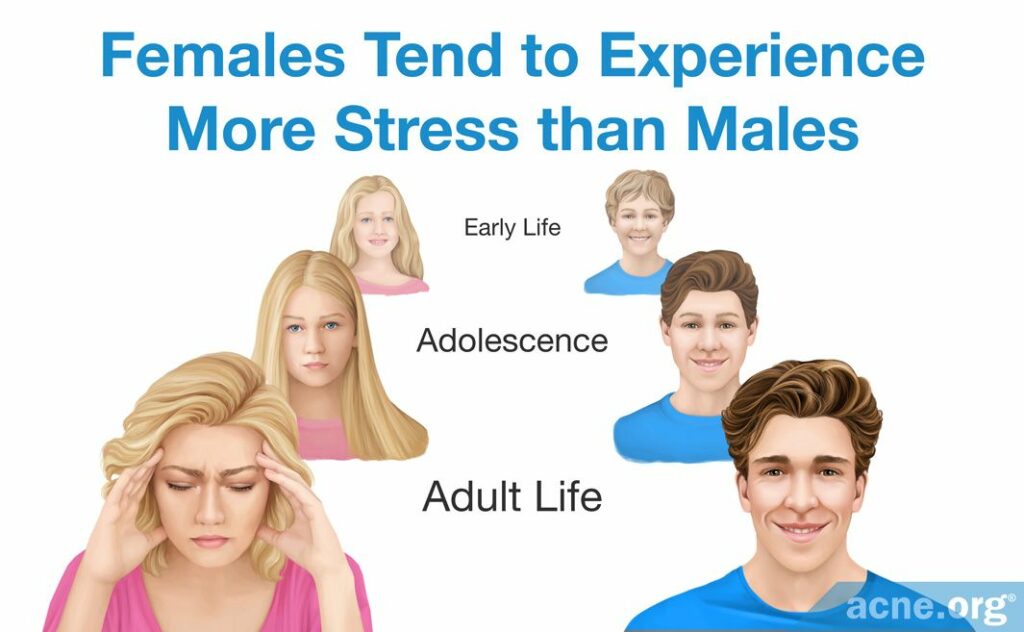
Generally, women and men are equally likely to develop a mental health disorder. When it comes to stress-related disorders like anxiety and depression, though, women are 50% more likely to develop one.1,9,10 There is much debate regarding why, and the answer is not known.
Women experience the most stress during:
- Adolescence
- Adult life
- Periods of hormonal shifts (puberty, pregnancy, postpartum, and menopause)
So essentially, women experience more stress throughout their entire lives.
Women experience more stress but not more acne than men
Although women experience a higher rate of stress and this could increase the rates of stress-related acne, this does not mean that women have more acne than men. In fact, males are more prone to developing acne than females. However, since women experience more stress, they are theoretically more likely to specifically develop stress-related acne than men.
Why Women Experience More Stress than Men
There are two main reasons that women experience more stress than men:
- Hormones
- Social factors
Hormones
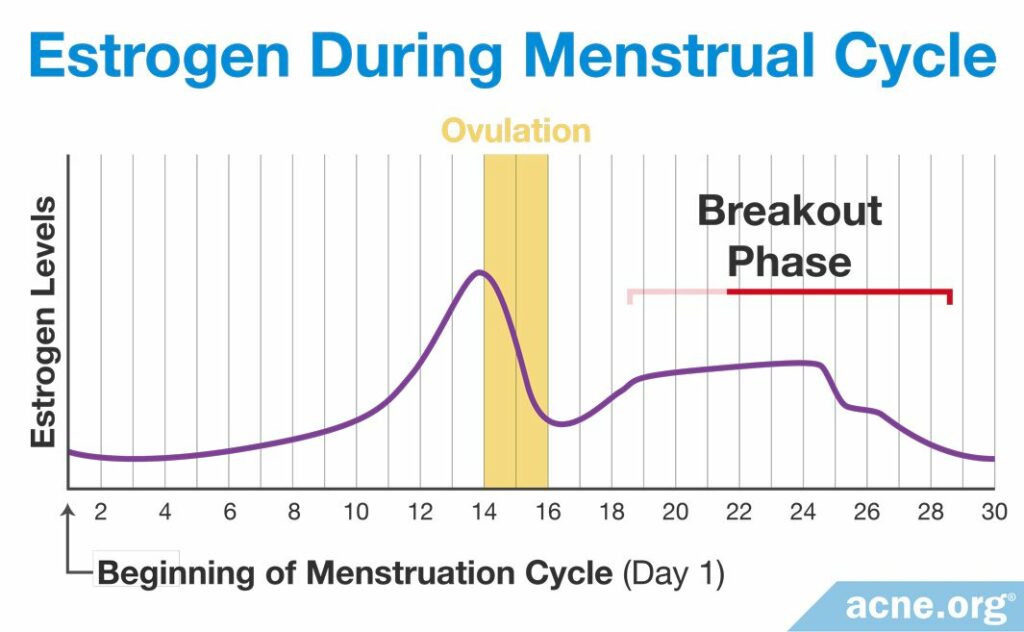
The main reason that women experience stress more than men is due to differences in hormones between women and men. During a female’s monthly cycle, the levels of hormones fluctuate, and this impacts the body in several respects, including in how it responds to stress.
One particularly important hormone is estrogen. Estrogen levels fluctuate throughout a woman’s monthly cycle. During days when there is a low amount of estrogen, women’s brains are more sensitive to stress.9,11
Social factors
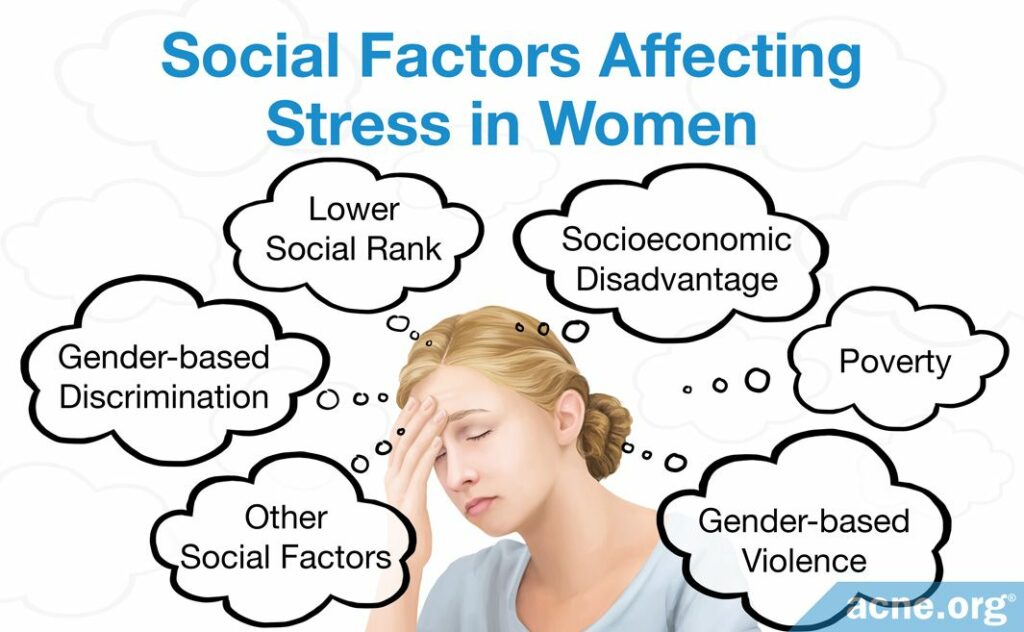
In addition to fluctuating hormone levels, women are more likely to experience stress-inducing social factors, including:
- Poverty
- Socioeconomic disadvantages
- Lower social rank
- Gender-based violence
- Gender-based discrimination
These societal pressures cause stress in all women, but can be especially stressful for those in difficult situations, such as single parenting and care-taking of elderly parents. This stress may lead to several stress-induced disorders, and potentially more acne.1
How to Manage Stress
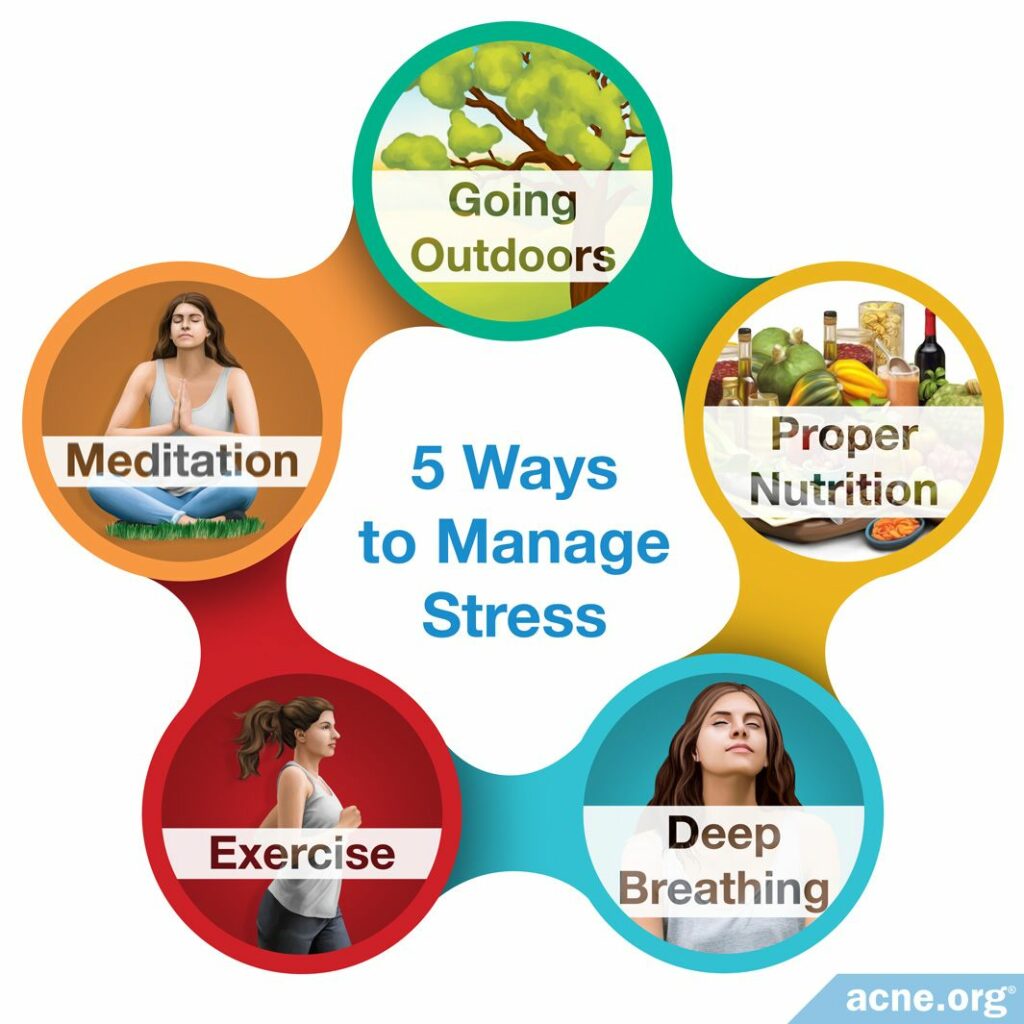
Nutrition
One way for women to manage stress is to maintain balanced nutrition. This can be accomplished by increasing the intake of nutrients important for brain health, production of anti-stress molecules, and stress response hormones. These nutrients include:
- B vitamins: B vitamins work in the brain to help regulate stress via serotonin production. B vitamins are commonly found in turkey, tuna, liver, legumes, whole grains, potatoes, and bananas.
- Vitamin C: Vitamin C works in the brain to help regulate stress via serotonin production. It also helps regulate the production of the hormone adrenaline, which increases in response to stress. Vitamin C is commonly found in fruits and vegetables like oranges, kiwis, peppers, and broccoli.
- Zinc: Zinc works in the brain to help regulate stress via serotonin production. It also helps regulate the production of the hormone adrenaline, which increases in response to stress. Zinc is commonly found in meat, fish, shellfish, eggs, dairy, grains, beans, and nuts. Oysters contain by far the highest percentage of zinc compared with any other food.
- Magnesium: Magnesium works in the brain to help regulate stress via serotonin production. It also helps regulate the production of the hormone adrenaline, which increases in response to stress. Magnesium is commonly found in spices, nuts, cereals, cocoa, and vegetables like spinach.1
Other ways to reduce stress
- Exercise: Exercise is a powerful way to reduce stress. During exercise, the body releases chemicals called endorphins, which act as natural painkillers and can help to reduce stress.
- Getting outside: Being outdoors helps to relax the body and is a great way to improve one’s mood and decrease stress.
- Meditation: Meditation helps to center oneself and focus on the present and has been proven to be powerfully effective at reducing stress, particularly when practiced regularly.12
- Community: In today’s world we are often separated from others and overly dependent on technology. Make a concerted effort to build your personal community and support structure, spending time with others in real life. And make sure you’re touching others and being touched.
References
- McCabe, D. & Colbeck, M. The effectiveness of essential fatty acid, B vitamin, Vitamin C, magnesium and zinc supplementation for managing stress in women: a systematic review protocol. JBI Database Syst Rev Implement Reports 13, 104 – 118 (2015). https://www.nursingcenter.com/journalarticle?Article_ID=3467525&Journal_ID=3425880&Issue_ID=3466946
- Chiu, A., Chon, S. Y. & Kimball, A. B. The response of skin disease to stress. Arch Dermatol 139, 897 – 900 (2003). https://www.ncbi.nlm.nih.gov/pubmed/12873885
- Bowe, W. Acne vulgaris, probiotics and the gut-brain-skin axis – back to the future? Gut Pathog 3, 1 – 11 (2011). https://www.ncbi.nlm.nih.gov/pubmed/21281494
- Borrel, V., Thomas, P., Catovic, C., et al. Acne and stress: Impact of catecholamines on Cutibacterium acnes. Front Med (Lausanne) 6, 155 (2019). https://pubmed.ncbi.nlm.nih.gov/31355200/
- Jović, A., Marinović, B., Kostović, K., Čeović, R., Basta-Juzbašić, A. & Bukvić Mokos, Z. The impact of psychological stress on acne. Acta Dermatovenerol Croat 25, 1133‐1141 (2017). https://pubmed.ncbi.nlm.nih.gov/28871928/
- Branisteanu, D. E., et al. Adult female acne: Clinical and therapeutic particularities (Review). Experimental and Therapeutic Medicine 23, 1-7 (2022). https://pubmed.ncbi.nlm.nih.gov/35069832/
- Passeron, T., et al. Adult skin acute stress responses to short-term environmental and internal aggression from exposome factors. Journal of the European Academy of Dermatology and Venereology: JEADV 35, 1963-1975 (2021). https://pubmed.ncbi.nlm.nih.gov/34077579/
- Pondeljak, N. & Lugović-Mihić, L. Stress-induced interaction of skin immune cells, hormones, and neurotransmitters. Clinical Therapeutics 42, 757-770 (2020). https://pubmed.ncbi.nlm.nih.gov/32276734/
- Maeng, L. Y. & Milad, M. R. Hormones and behavior sex differences in anxiety disorders: Interactions between fear, stress, and gonadal hormones. Horm Behav 76, 106 – 117 (2015). https://www.ncbi.nlm.nih.gov/pubmed/25888456
- Bale, T. L. & Epperson, C. N. Sex differences and stress across the lifespan. Nat Neurosci 18, 1413 – 1420 (2015). https://www.ncbi.nlm.nih.gov/pubmed/26404716
- Li, S. H. & Graham, B. M. Why are women so vulnerable to anxiety, trauma-related and stress-related disorders? The potential role of sex hormones. Lancet Psychiatry 4, 73 – 82 (2017). https://www.ncbi.nlm.nih.gov/pubmed/27856395
- Thakur, D., et al. Effect of yoga on polycystic ovarian syndrome: A systematic review. Journal of Bodywork and Movement Therapies 27, 281-286 (2021). https://pubmed.ncbi.nlm.nih.gov/34391246/
 Acne.org Products
Acne.org Products